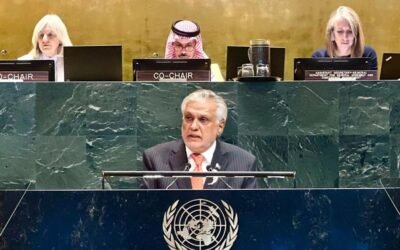A Landmark in Pakistan’s Democratic Evolution
The 18th Amendment was a landmark achievement for Pakistan’s democratic evolution. By rolling back decades of concentrated federal authority and restoring legislative space to the provinces, it sought to make governance more responsive and locally accountable. In practice, however, the rapid devolution of powers exposed institutional gaps that were never fully closed: planning capacity, budgetary arrangements, and intergovernmental dispute-resolution mechanisms lagged behind the transfer of responsibilities. International development institutions and scholars have described the Amendment as a decisive first step that remains incomplete without complementary reforms to coordination and capacity.
You May Like to Read: Pakistan Establishes Diplomatic Relations with Micronesia
Governance Friction and National Projects
The clearest manifestation of friction between levels of government in recent months has been around natural resources and major national projects. The Council of Common Interests (CCI), the constitutional forum created to resolve these disputes, has repeatedly been called into play, most recently to halt a federal decision on new canal projects until provinces reach consensus. That episode underlined two uncomfortable facts. First, central ministries cannot unilaterally press ahead with projects that affect provincial jurisdictions; second, the formal mechanisms for timely agreement are not always effective at preventing political breakdowns that threaten national cohesion and investor confidence.
Fiscal Constraints and Policy Fragmentation
Fiscal relations have similarly evolved in ways that complicate national policymaking. The 7th National Finance Commission award broadened the formula for distributing federal resources, moving away from a pure population-based share and introducing multiple performance and need-based indicators. That redistribution increased provincial revenue autonomy but also left the federal government with constrained fiscal space to run nationwide programmes, especially for infrastructure and energy projects that require consistent, cross-provincial financing and coordination. Analysts warn that unless fiscal frameworks are recalibrated to match the devolution of responsibilities, fragmentation will become the default mode of public investment.
Why a Constitutional Review is Necessary
A constitutional review does not mean rolling back the spirit of devolution. It means honest housekeeping: aligning constitutional text, fiscal instruments, and institutional practices so responsibilities come with commensurate capacity and resources. Experience shows that devolution without adequate technical support invites blame games. Provinces complain of unfunded mandates; the centre points to uneven implementation and the need for national standards. The World Bank’s review of federal public expenditure emphasizes that the amendment’s promise requires practical fixes in intergovernmental coordination, planning, and dispute resolution rather than partisan rewrites.
What a Sensible Review Should Include
A balanced constitutional review should focus on strengthening the CCI with clearer timelines and binding arbitration pathways for disputes that threaten national projects. It should equip the Planning Commission and related federal bodies to support provincial project design and appraisal. Fiscal mechanisms, including the NFC process, must be made more transparent and predictable, with conditional transfers for nationally important projects that respect provincial autonomy. Legal ambiguities in areas like natural resources, water, and large-scale infrastructure must be clarified to reduce litigation and policy paralysis. These are technical fixes that can be debated and agreed upon without undermining provincial dignity.
Building Political Consensus
Any constitutional change requires broad consensus and a two-thirds majority in Parliament. This means the exercise has to be led by coalition-building and public consultation rather than executive fiat. Civil society, provincial assemblies, bar associations, and policy institutes should be invited to make concrete recommendations so the review is not perceived as a partisan move. Importantly, a review should be framed as a governance reform aimed at delivering better public services, not as a power struggle between Islamabad and provincial capitals. Past debates have shown that when constitutional conversations are framed around outcomes, schools, hospitals, water management, they attract wider public buy-in.
While the 26th amendment was hurriedly rushed through Parliament earlier this morning, the case was very different in 2010 when the 18th amendment was passed, which included a total of 102 amendments. pic.twitter.com/2Lu0LYbRDp
— PILDAT, Pakistan (@Pildat) October 21, 2024
Balancing Unity and Autonomy
Pakistan cannot afford repeated stop-starts on projects that require national consensus, whether dams, national highways, or energy corridors. The cost of fragmentation shows up in delayed timelines, higher financing costs, and lower investor confidence. At the same time, any attempt to recentralize without safeguards would risk reversing democratic gains and feeding regional grievances.
A carefully conducted constitutional review offers a middle path, i.e, preserving the 18th Amendment’s decentralising spirit while fixing the institutional architecture that makes decentralized governance work in practice.
You May Like to Read: Pakistan’s Naval Renaissance
Concluding: The Path Forward
If Pakistan approaches this review with seriousness, transparency, and technical depth, it can turn a decade-and-a-half of constitutional experiment into durable federal practice. That means strengthening intergovernmental bodies, rethinking fiscal incentives, clarifying jurisdictions, and, above all, putting national projects and service delivery ahead of zero-sum political posturing.
A constitutional review is not an admission of failure; it is a mature nation’s decision to refine its rules so federalism becomes a source of unity and effectiveness rather than fragmentation. The country’s future development depends as much on those governance choices as on policy headlines.




























